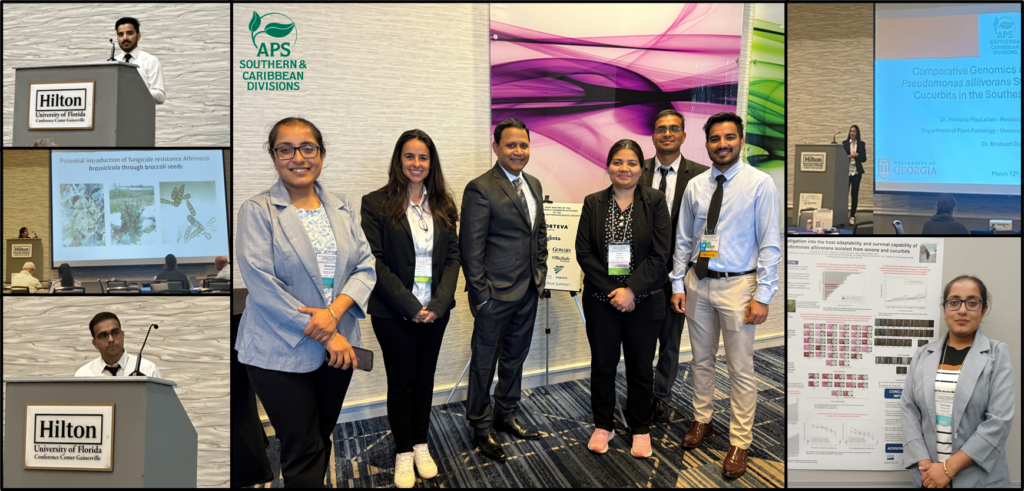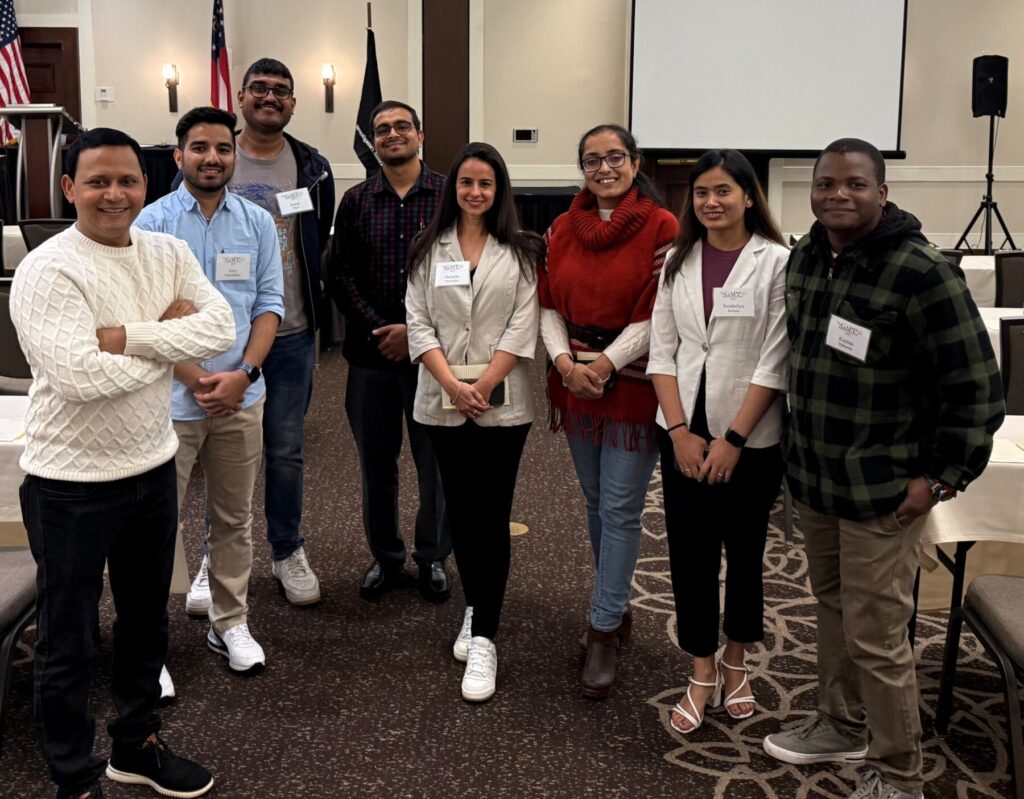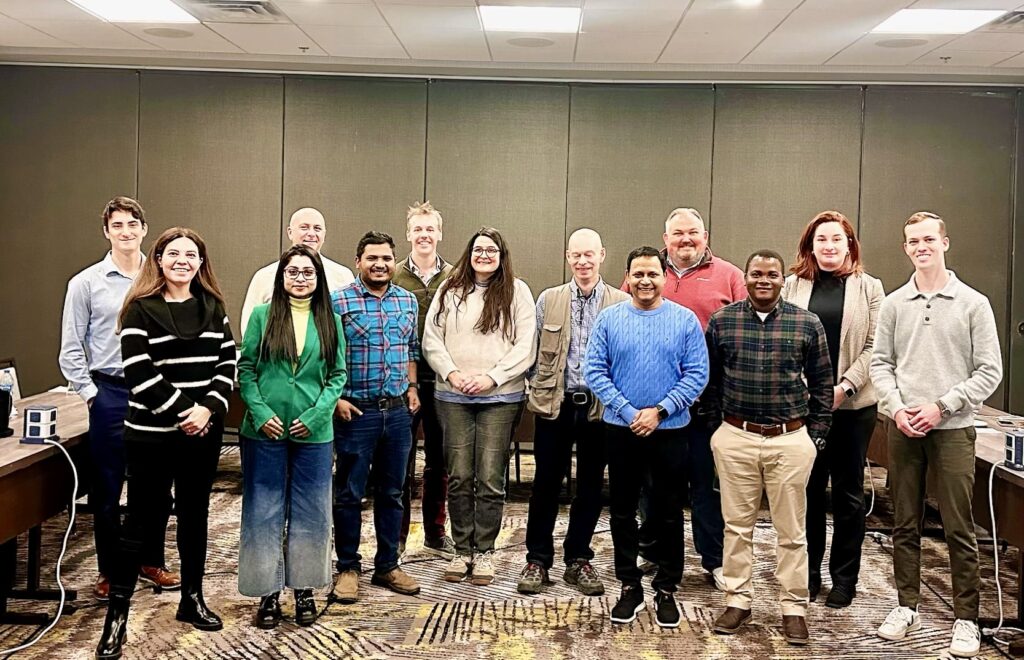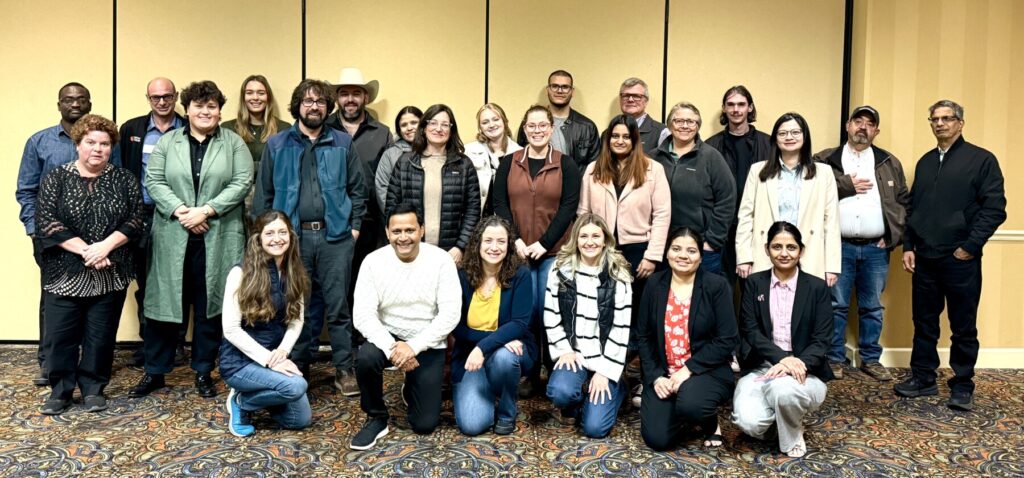Dr. Dutta’s Research on Anthracnose in Peppers Featured in Specialty Crop Grower Magazine
Dr. Dutta’s collaborative work on anthracnose disease in peppers has been highlighted in the May 2025 issue of Specialty Crop Grower magazine. The article covers the growing challenges of anthracnose in Georgia’s pepper crops and emphasizes the importance of integrated disease management strategies. Dr. Dutta, along with researchers from UGA and Cornell University, discussed ongoing efforts to study pathogen biology, identify resistant varieties, and understand cultural practices that would reduce its severity.
To read the full article, visit the link below:
https://specialtycropgrower.com/anthracnose-pepper-georgia-cornell-uga-dutta/
Dutta Lab Participates in Joint Caribbean and Southern Division APS Meeting, 2025
Members of Dr. Dutta’s lab actively participated in the 2025 Joint Meeting of the Caribbean and Southern Divisions of the American Phytopathological Society (APS), held from March 9–13 in Gainesville, Florida. Lab members delivered both oral talks and posters, showcasing their ongoing research. The 3-day event featured a variety of sessions, including the Careers 101 Workshop, Graduate Student/Postdoc Networking Event, Plant Pathology Unit Leaders Meeting, and a Field Tour of the UF/IFAS Plant Science Research and Education Unit. The meeting also hosted the Emerging Viruses of Cucurbits Working Group, offering a valuable platform for knowledge exchange and professional development.

From Right (Group photograph): Mr. Anuj Lamichhane, Mr. Santosh Koirala, Dr. Navjot Kaur, Dr. Bhabesh Dutta, Dr. Michelle Maclellan and Dr. Shatrupa Ray
Dutta Lab Engages with Peers at Annual GAPP Meeting in Brasstown Valley Resort, Young Harris, GA
All members of Dr. Dutta’s lab attended the Annual Meeting of the Georgia Association of Plant Pathologists (GAPP), held at the scenic Brasstown Valley Resort in Young Harris, Georgia. The team actively participated in discussions, networked with fellow plant pathologists from across the state, and exchanged ideas related to their specific research interests and industry-related challenges. The event provided an excellent opportunity for professional growth, collaboration, and staying current with advancements in plant pathology across Georgia.

From Right: Dr. Kephas Mphande, Mrs. Surakshya Bohora, Dr. Shatrupa Ray, Dr. Michelle Maclellan, Mr. Santosh Koirala, Mr. Karan Patel, Mr. Anuj Lamichhane and Dr. Bhabesh Dutta
Onion-IQ Stakeholder Meeting at Savannah, GA in 2025
From January 9–11, 2025, the OREI-funded Onion-IQ Stakeholder Meeting was held in Savannah, Georgia. This meeting brought together researchers, stakeholders, and industry experts to discuss research findings and share strategies for improving sustainable organic onion production. The event provided a valuable platform for exchanging ideas, addressing challenges, and exploring solutions to support the growth of organic onion farming.

First SCRI-SAM Annual Meeting on Cucurbit Anthracnose
On December 4, 2024, the first SCRI–SAM Stakeholder Advisory Panel Meeting convened in Myrtle Beach, South Carolina, bringing together researchers to discuss sustainable strategies for managing cucurbit anthracnose.

Dutta’s Lab Presents at 2024 The Plant Center Retreat
On October 31, 2024, members of Dr. Dutta’s lab attended the 2024 The Plant Center Retreat at Callaway Resort and Gardens in Pine Mountain, Georgia. Each member presented posters showcasing their individual research projects, engaging with peers and receiving valuable feedback. It was a productive event for sharing knowledge and connecting with fellow researchers. We’re proud of the team’s hard work and contributions!

From Right: Mr. Santosh Koirala, Mr. Anuj Lamichhane, Dr. Michelle Maclellan, Dr. Anoop Malik, Dr. Bhabesh Dutta, Dr. Navjot Kaur, Dr. Kephas Mphande, Mrs. Surakshya Bohora, and Dr. Shatrupa Ray
Dr. Michelle Wins Third Prize at 2024 The Plant Center Retreat!
We are excited to share that Dr. Michelle Maclellan, a post-doctoral researcher in Dutta’s lab, showcased her research and won third prize in the poster competition in the post-doc category. This recognition highlights her dedication and the impactful nature of her work. Congratulations to Dr. Michelle on this well-deserved achievement!

Congratulations to Dr. Brendon Myers!
We are thrilled to announce that Brendon Myers has successfully defended his PhD! His dedication and hard work have been exceptional, and we’re incredibly proud of his achievement. Brendon has been a valuable member of our lab, and we look forward to seeing that impact of his research as he embarks on the next chapter of his career. Please join us in congratulating Dr. Myers on this well-deserved success!

From Right: Anuj, Kephas, Bhabesh (PI), Karan, Brendon, Navjot, Anoop, Michelle, Santosh, and Shatrupa
Dr. Dutta’s insights on Fusarium wilt in watermelon spotlighted in the September 2024 issue of Specialty Crop Grower magazine
Dr. Dutta’s work on Fusarium wilt in watermelon was featured in the September 2024 issue of Specialty Crop Grower magazine. He shared his research on managing this disease, highlighting successful trials using Carolina Strongback rootstocks, which are known for their resistance. Dr. Dutta also stressed the importance of effective cultural practices to improve crop resilience and sustainability.
For more details, check out the full article through the link below.
UGA’s Extension Vegetable Pathology Program led by Dr. Dutta has been providing insights that were featured in Specialty Crop Grower magazine
Dr. Dutta’s Extension Vegetable Program has been prominently featured in the popular Specialty Crop Grower magazine, sharing his research highlights and expert perspectives on critical issues affecting agriculture. Throughout January, May, and June of this year (2024), he provided growers with timely and essential knowledge on pressing topics, including Anthracnose Attacks on Watermelons, Downy Mildew in South Georgia Cucurbit Fields, and the innovative use of Carolina Strongback Rootstock for Fusarium Wilt in Watermelons.
These articles are not only aimed at raising awareness but also underscore the urgent need for proactive solutions in the field. Specialty Crop Grower, a publication of AgNet Media, represents a merger of two highly respected industry voices: the 116-year-old Florida Grower and Specialty Crop Industry.
For more insights, explore the full articles via the link below.
https://specialtycropgrower.com/?s=Bhabesh+Dutta
PhD Exit Seminar: Unraveling Onion Pathogen Secrets with AI and Genomics!
Mr. Brendon Myers, a grad student of my lab, successfully delivered his PhD exit seminar titled “Integrating AI and Genomics for Deeper Insights in Pantoea ananatis Virulence in Onion” on August 26th, 2024. The seminar was held at the UGA Athens Campus and was also streamed via Zoom for participants from other campuses. Brendon’s work represents a significant advancement in understanding onion pathogens and highlights the power of combining artificial intelligence with genomic data to reveal new insights into plant disease mechanisms.
Congratulations to Brendon for his outstanding research contributions and successful seminar!
Dr. Navjot Kaur (post doc) shared insights on Fungicide Resistance in A. brassicicola in Broccoli from Dr. Dutta’s lab with Cornell AgriTech, Cornell University
Dr. Kaur, a postdoctoral researcher in my lab, delivered an invited seminar as part of the renowned Plant Path Geneva Seminar series. The seminar was hosted by Dr. Sarah Pethybridge at Cornell AgriTech, Cornell University. The title of the seminar was “Fungicide Resistance: A Saga of Alternaria brassicicola introduction through seeds in broccoli.” During the seminar, Dr. Kaur provided an in-depth analysis of the challenges posed by Alternaria brassicicola in broccoli, specifically focusing on the fungicide resistance introduced through seeds. The talk was well-received and sparked engaging discussions on strategies to manage this persistent issue in vegetable production.
Congratulations to Dr. Kaur for this successful presentation and for contributing valuable knowledge to the field of plant pathology!
Dutta lab attended the annual APS meeting in Memphis, Tennessee

~ (From the left) Michelle MacLellan, Navjot Kaur, Bhabesh Dutta (PI), and Anuj Lamichhane
4-H students hosted by Dr. Dutta in the Department of Plant Pathology have come to experience Vegetable Pathology Program at the UGA, Tifton Campus


UGA graduate student recently graduated with a Ph.D. and transitioned into his new post-doc position at UC Davis
Clarence Codod who received his PhD with the University of Georgia back in 2023 has completed and published his paper on the “Assessment of prickly sida as a potential inoculum source for golden mosaic virus in commercial snap bean farms in southern Georgia.”
Three new Post-doctoral associates have joined Dutta’s lab early 2024
UGA plant Pathology would like to welcome the three new additions joining Dutta’s lab. Dr. Shatrupa Ray who recently joined our lab in February 2024, Dr. Kephas Mphande, who just joined in early March 2024, and Dr. Anoop A Malik, who joined in early May 2024.
Dutta will lead a $3.2M USDA grant to improve organic onion production in the Southern US (https://newswire.caes.uga.edu/story/10298/improving-organic-onions.html)
Dutta and collaborators will lead a USDA-NIFA funded OREI project to develop strategies to improve quality of short-day organic onions. Soil-borne bacterial pathogens are the significant critical limiting factors for sustainable organic onion production in the southern US. Most conventional and organic management practices for pathogen control are either ineffective or have not been rigorously evaluated for these issues. Hence, the University of Georgia and the Texas A&M University will coordinate an integrated multi-regional effort to improve the quality of organically-grown onions by managing soil-borne bacterial diseases (sour skin and slippery skin) through the optimization of nitrogen fertilization and the use of cultural practices (bio-fumigation and soil solarization). We will develop research-based tools to improve soil fertility, soil health, and food safety in organic onions grown in the southeastern and southwestern U.S. Using an integrated approach, we will optimize organic nitrogen-fertilization scheduling in organic onions that will increase productivity, improve soil health (decrease in pathogenic bacterial populations and increase in beneficial microflora), and improve food safety. We will integrate bio-fumigation and soil-solarization with nitrogen fertilization strategies, soil-biome [both micro and macro (insect natural enemies and predators)] assessments, and evaluations of plant-parasitic and beneficial nematodes, weeds and soil-borne bacterial diseases that will improve quality of organic onion production. We will integrate economic assessments, extension and education efforts into each objective that will further strengthen our project.
Dutta will be leading a multi-state USDA-funded SCRI project on Cucurbit Anthracnose (https://newswire.caes.uga.edu/story/10336/usda-cucurbit-grant.html)
Dutta and collaborators from seven different institutions were funded ($4.8 M) for four years to develop a comprehensive anthracnose management toolkit for our cucurbit growers in the Eastern US. A coordinated, multi-state effort is required to improve our understanding of the recent anthracnose outbreaks by determining pathogen biology, population structure, host specificity, and fungicide resistance profiles of Colletotrichum spp. causing severe anthracnose outbreaks in cucurbit crops. This knowledge will lead to improved management strategies. Assessing the effects of specific production practices, environmental conditions, and inoculum on disease outbreaks can aid the development of practical, economically viable, and environmentally-sound strategies to limit yield losses due to anthracnose. Our team will address the pathogens (leverage genomics and population biology to identify the Colletotrichum species complex(es) and inoculum sources), the host (screen commercial varieties and PI lines), and the environment (production practices) that constitute the disease triangle. We will integrate economic assessments and Extension efforts into each objective to further strengthen our project.
UGA Plant Pathology wants to say goodbye and good luck to two members within Plant Pathology that worked under Dr. Bhabesh Dutta.
Post-doctoral associate Vishal Negi was very humble and very easy to talk to, and always lit up the room when he was in the lab. He was a hard worker and a great asset to UGA Tifton, Plant Pathology. As hard as it is to say goodbye, we all wish him best of luck on his next journey. Vishal has accepted a research scientist position at the Florida Department of Agriculture and Consumer Services in Gainesville, Florida.
Clarence Codod was a great guy and we all enjoyed working with him. He was a graduate student for UGA Tifton that studied under Dr. Bhabesh Dutta and Dr. Bob Kemerait. He worked hard and always strived for the best. He was able to successfully defend his PhD program to earn his degree in Plant Pathology. He was offered a Post-doctoral associate position at UC Davis to work on blue berries and is on his way to a new journey. Everyone at UGA Plant Pathology want to wish him good luck!
Georgia Vegetable Commission approved funding for three projects in Dr. Bhabesh Dutta’s lab.
- Dr. Michelle MacLellan will work on assessing risk of bacterial (Pseudomonas capsici) transmission in solanaceous and cucurbitaceous crops grown in Georgia.
- Dr. Sunil Gangurde will work on the evaluation of fungicide programs targeting susceptible growth stages in broccoli against Alternaria leaf blight and head rot.
- Dr. Bhabesh Dutta was granted a fund for evaluation of fungicides against Alternaria leaf blight of carrot
News media coverage on our research and extension program:
- Dutta, B., 2023. Major Scientific Breakthrough in Onion Research. April 2023.
- Dutta, B., Grey, T., 2023. Organic onion Production is a challenge in the Southeast. April 2023.
- Dutta, B., Grey, T., and Schmidt, J. 2022. Neglecting weeds can lead to late-season disease in organic onions. Specialty Crop News. March 2022.
- Dutta, B., DevKumar, G., Kvitko, B.H., and Naikare, H. 2021. Studying Salmonella contamination in onion. Vegetable and Specialty Crop News, August 2021.
- Dutta, B. 2021. Managing whitefly transmitted viruses in Georgia. Vegetable and Specialty Crop News, June 2021.
- Dutta, B. 2021. Factors to consider when managing Phytophthora fruit rot in watermelon. Vegetable and Specialty Crop News, June 2021.
- Dutta, B. and Petkar, A. 2021. Management of Alternaria blight and head rot in brassica. Vegetable and Specialty Crop News, June 2021.
- Dutta, B. 2021. Onion disease management in Georgia. Vegetable and Specialty Crop News, February 2021.
- Dutta, B and Gitaitis, R.D. 2020. Disease quiz II. Onion World Magazine. January 2021.
- Thompson, C. 2020. Organic Vidalia Onion Industry: Challenges in sour skin management. Onion World Magazine. December 2020.
- Dutta, B and Gitaitis, R.D. 2020. Disease quiz I. Onion World Magazine. July 2020.
- Lameiras, M.M. 2020. UGA researchers discover genes that allow bacteria to resist onion’s natural defenses. CAES News and Events, July 2020.
- Thompson, C. 2020. Vidalia onion crop looks ‘favorable’ despite presence of downy mildew disease in localized areas. Vegetable and Specialty Crop News, April 2020. (edits provided by B. Dutta)Cabrera, E. 2020. Alternaria Leaf Blight and Head Rot in Brassica: A mystery or an old nemesis with new arsenal? UGA IPM Newsletter, March 2020.
- Thompson. 2020. Managing Fusarium wilt disease in watermelon. Vegetable and Specialty Crop News, March 2020.
- Robinson, A. 2020. Fungicide Update for Vegetable Crops. Vegetable and Specialty Crop News, March 2020.
- Arboleda, K. 2019. UGA Researchers working on disease control in Vidalia onions. Vegetable and Specialty Crop News, December 2019.
- Thompson, C. 2019. Center rot disease in organic onion growing studied. Vegetable Growers News, November 2019.
- Arboleda, K. 2019. UGA Researchers working on disease control in Vidalia onions. Vegetable and Specialty Crop News, December 2019.
- Thompson, C. 2019. UGA CAES part of extensive research study aimed at whitefly management. CAES News and Events, June 2019.
- Thompson, C. 2019. Georgia vegetable growers need to apply fungicides to stay ahead of downy mildew disease. CAES News and Events, June 2019.
- Thompson, C. 2019. Postharvest diseases a concern for onion producers. CAES News and Events, April 2019.
- Thompson, C. 2019. UGA’s Dutta, Brenneman honored with IPM awards. CAES News and Events, April 2019.
- Thompson, C. 2019. Fungicide resistance spells trouble for Georgia, Virginia vegetable farmers. CAES News and Events, March 2019.
- Thompson, C. 2019. UGA onion agent tells Georgia farmers to be proactive with fungicides. CAES News and Events, January 2019.
- Thompson, C. 2019. UGA faculty, Extension agents honored for work in fruit and vegetable industry. CAES News and Events, January 2019.
- Thompson, C. 2018. Multistate research projects vital to solving broad agricultural issues. CAES News and Events, December 2018.
- Thompson, C. 2018. Traps key component of UGA whitefly research. CAES News and Events, August 2018.
- Thompson, C. 2018. UGA’s Bhabesh Dutta recognized with 40 under 40 honor. CAES News and Events, July 2018.
- Thompson, C. 2018. UGA CAES team researching whiteflies statewide. CAES News and Events, June 2018.
- Thompson, C. 2018. Rain stunts peanut crop, creates perfect conditions for vegetable diseases. CAES News and Events, May 2018.
- Thompson, C. 2018. Georgia watermelon farmers mindful of potential disease pressure following rainfall. CAES News and Events, April 2018.
- Thompson, C. 2018. UGA research aimed at stopping gummy stem blight in the greenhouse. CAES News and Events, March 2018.
- Nolin, J. 2017. Whiteflies threaten Georgia crops. CAES News and Events, December 2017.
- Thompson, C. 2017. Rainy month increases likelihood for watermelon diseases. CAES News and Events, June 2017.
- Thompson, C. 2017. Fumigation a tool for Georgia watermelon farmers fighting Fusarium wilt disease. In: Vegetable Growers News. CAES News and Events, June 2017.
- Schreckengost, J. 2017. Georgia Onion Industry Faces Bacterial Disease Pressures. In: Vegetable and Specialty Crop News. October 2017.
- Schreckengost, J. 2017. Cucurbit Crop Concerns for Georgia Growers. In: Vegetable and Specialty Crop News. October 2017.
- Schreckengost, J. 2017. Research begins on Fusarium wilt affecting watermelon. In: Vegetable and Specialty Crop News. June 2017.
- Alexander, L. 2016. The effect of soil fertility on Fusarium wilt in watermelon. In: Southeast Report: Disease Management. December 2016.
- Thompson, C. 2016. UGA plant pathologist warns farmers to spray now to prevent watermelon disease. In: Georgia Faces. June 2016.
- Thompson, C. 2015. Watermelon diseases a problem for Georgia farmers. CAES News and Events, August 2015.
- Dutta, B., and Gitaitis, R. 2015. Exploring new pathways in plant pathology. In: International Innovation. September 2015.